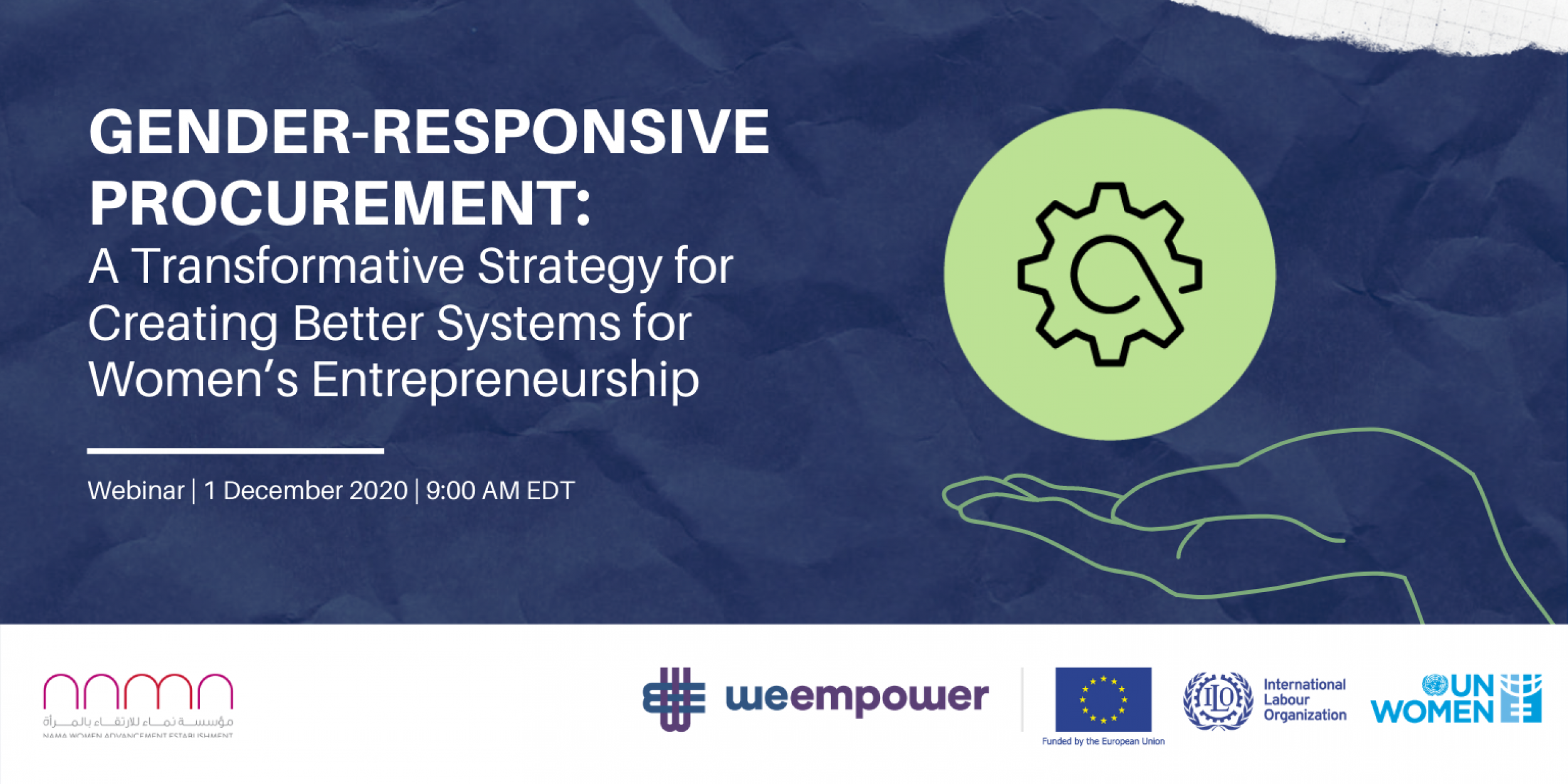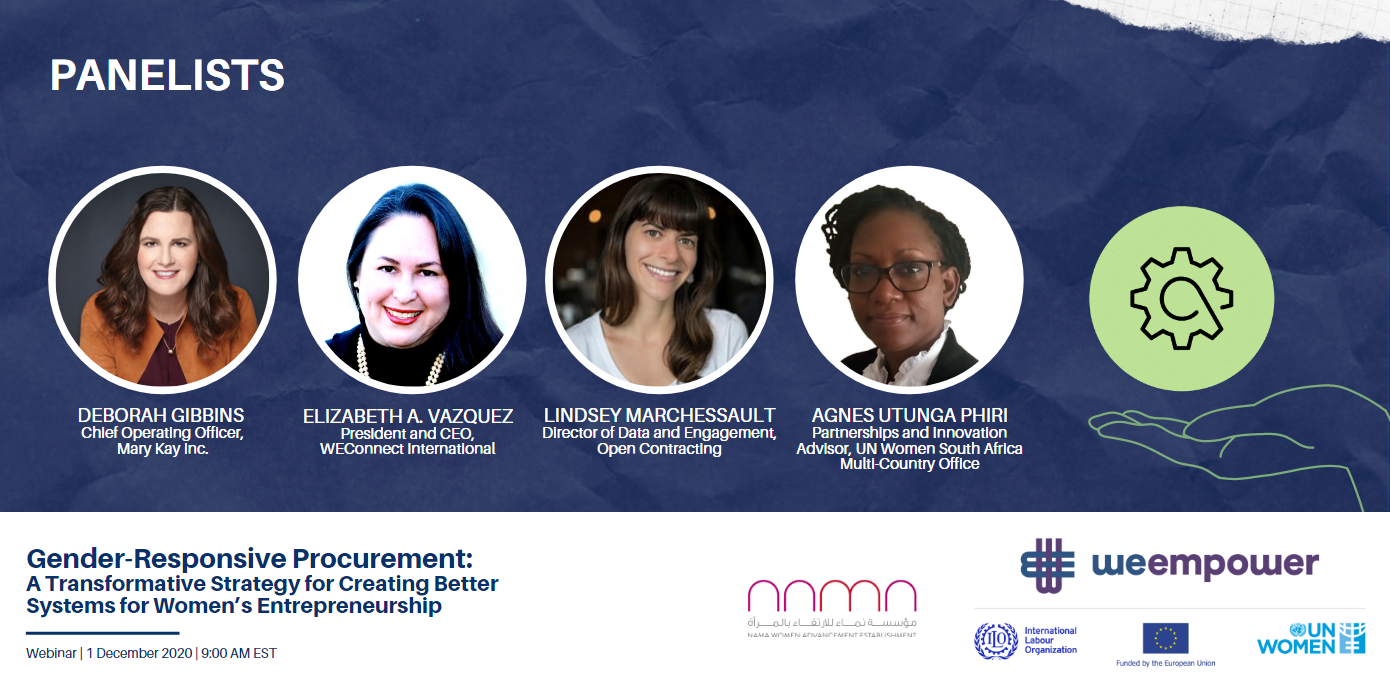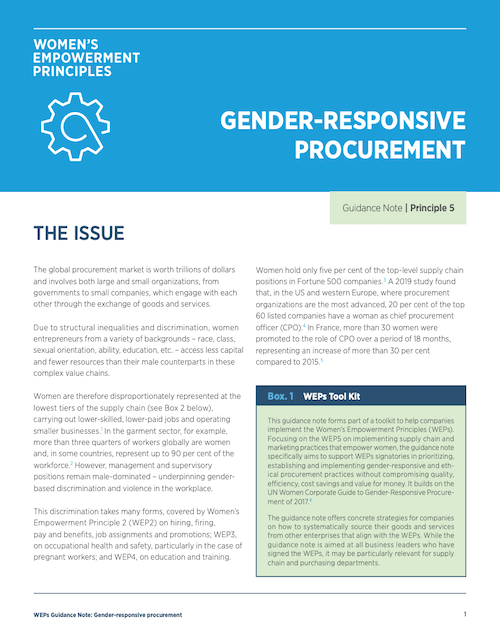
POST EVENT
On 1 December 2020, UN Women hosted the Gender-Responsive Procurement: A Transformative Strategy for Creating Better Systems for Women’s Entrepreneurship webinar. It showcased the potential offered by gender-responsive procurement in times of COVID-19, and strategies and practices which the public and private sector can adopt to undertake this approach. The panelists spoke about practical policies, practices and services that companies could develop, implement and practice to help in the procurement responses.
The event was co-hosted by the Promoting Economic Empowerment of Women at Work through Responsible Business Conduct in G7 Countries Programme and UN Women’s Flagship Programme on Stimulating Equal Opportunities for Women Entrepreneurs.
THE EVENT
The pandemic has been especially crushing for women and, if action is not taken soon, the progress made over the past twenty-five years towards gender equality will be lost. Women’s enterprises are particularly susceptible to economic shocks and research confirms the severe impact of COVID-19 on small and medium enterprises, particularly women-owned enterprises. Much of this was expected already at the outset of the pandemic since previous crises have shown similar impact on women. This crisis has simultaneously impacted women in the areas where gender inequities are most severe and most persistent.
Governments have responded to the economic effects of COVID-19 with fiscal and monetary stimuli. Their response has been swift and massive—over ten trillion dollars and counting. But that response has largely ignored the needs of women. Only one in eight countries has measures in place to protect women against the socio-economic impacts of the virus. Very few measures have been put in place to support women’s businesses across the globe.
This crisis is an opportunity to advance on long-pending reform and action. UN Women is advocating for gender-responsive procurement to be undertaken as a strategic lever to support women’s owned businesses and gender-responsive businesses to build back better from the economic impact of COVID-19.
More than one third of all firms are owned by women, yet it is estimated they receive only one per cent of corporate procurement spend. Public and private procurement generates trillions of dollars in economic activity and fuels market interactions that span across the globe. Public procurement accounts for 12 per cent of global Gross Domestic Product (GDP) , representing 10 to 15 per cent of the GDP in developed countries and up to 30 to 40 per cent in least developed countries. Estimates suggest that corporate procurement offices manage an average of 64 per cent of a company’s total enterprise spend. It is clear, procurement and purchasing practices have the potential to contribute to gender equality and women’s empowerment.By redressing the balance and adopting inclusive procurement practices and buying from gender-responsive companies, such as WEPs signatories, the public and private sector enhance their supplier diversity and contribute to reducing systemic discrimination.
The webinar will showcase the potential offered by gender-responsive procurement in times of COVID-19, and strategies and practices which the public and private sector can adopt to undertake this approach. The panelists will speak about practical policies, practices and services that companies could develop, implement and practice to help in the procurement responses.
REGISTER AND JOIN THE EVENT
AGENDA
09:00 – Welcoming remarks
Janna Schonfeld, Foreign Policy Instrument of the European Union, EU Delegation to the US
09:05 – Overview Women’s Empowerment Principles and UN Women’s Guidance Note on Gender-Responsive Procurement
Meral Guzel, Women's Empowerment Principles Specialist , UN Women
09:15 – Panel discussion
Moderated by: Meral Guzel, Women's Empowerment Principles Specialist , UN Women
Deborah Gibbins, Chief Operating Officer, Mary Kay Inc.
Elizabeth Vazquez, Chief Executive Officer, WEConnect International
Lindsey Marchessault, Director of Data and Engagement, Open Contracting
10:00 am – Closing remarks
Agnes Utunga Phiri, Partnership and Innovation Advisor, UN Women South-Africa Multi-Country Office

Janna Schonfeld joined the EU Delegation to the US as Programme Manager for Foreign Policy Instruments in 2019. She has been working for over 15 years on European Union Affairs, mostly on EU External Relations. Her work experience within the EU Institutions includes the European Parliament, the European Commission services for Enlargement and for Development and Cooperation as well as the EU Executive Agency for Small and Medium-sized Enterprises. She served as Policy Officer for Development and Climate Change in Brussels office of the ACT Alliance (NGO). Next to her professional career, she has pursued voluntary work around the world, in particular related to youth and the environment. She holds an MA in International Studies and a BA in European Studies.
Deborah Gibbins is Chief Operating Officer of Mary Kay Inc., and responsible for the company’s global supply chain and research and development organizations. In addition, she oversees the finance, public affairs and strategic planning divisions at Mary Kay Inc. Mary Kay Inc. is the founder of the Women’s Entrepreneurship Accelerator, a multi-partner initiative designed to inspire, educate, and empower women entrepreneurs around the world.
Elizabeth A. Vazquez is the President, CEO, and Co-Founder of WEConnect International, a corporate led non-profit that helps to empower women business owners to succeed in global markets. She is a serial social entrepreneur and world leader in global supplier diversity and inclusion.
Lindsey Marchessault is Director of Data and Engagement at Open Contracting, an independent not-for-profit working in over 30 countries advocating for better, more responsive and more open public contracting. In 2020 Open Contracting undertook research which identified key challenges faced by both governments and women-led businesses as well as innovative practices in the open contracting community.
Agnes Utunga Phiri is the Partnership and Innovation Advisor at the UN Women South Africa Multi-Country Office.She has worked for over 20 years with various UN agencies like UNDP, ILO Southern Africa on Promotion of Maternity Protection for Informal Workers and the UNFPA on th eending child marriages in Malawi through traditional leaders. Agnes was also part of the United Nations Observer Mission contingent to monitor the first South Africa Democratic Elections in 1994.
GUIDANCE NOTE
The Gender-Responsive Procurement Guidance Note helps companies implement the Women’s Empowerment Principles (WEPs). Focusing on Principle 5 implementing supply chain and marketing practices that empower women, the guidance note specifically aims to support WEPs signatories in prioritizing, establishing and implementing gender-responsive and ethical procurement practices without compromising quality, efficiency, cost savings and value for money.
This publication offers companies guidance on the following factors to consider when transforming procurement process within an enterprise and across departments:
ORGANIZERS
The event is co-hosted by the Promoting Economic Empowerment of Women at Work through Responsible Business Conduct in G7 Countries Programme and UN Women’s Flagship Programme on Stimulating Equal Opportunities for Women Entrepreneurs.
Promoting Economic Empowerment of Women at Work through Responsible Business Conduct in G7 Countries (WE EMPOWER - G7 Programme) is a programme funded by the European Union (EU) and implemented by UN Women and the International Labour Organization (ILO). The WE EMPOWER G7 Programme convene multistakeholder dialogues in the EU, Canada, Japan and the US to exchange knowledge, experiences, good practices and lessons learned in the context of the changing world of work.
The Women’s Empowerment Principles (WEPs) are a set of Principles offering guidance to business on how to promote gender equality and women’s empowerment in the workplace, marketplace and community. Established by UN Global Compact and UN Women, the WEPs are informed by international labour and human rights standards and grounded in the recognition that businesses have a stake in, and a responsibility for, gender equality and women’s empowerment.
UN Women’s Flagship Programme on Stimulating Equal Opportunities for Women Entrepreneurs undertakes research, capacity building, and advocacy to support women entrepreneurs through promoting gender-responsive procurement in the public and private sectors, supporting women entrepreneurs to be better positioned in supply chains and access these opportunities and to strengthen their access to finance. The flagship programme is generously supported by NAMA Women Advancement Establishment.


